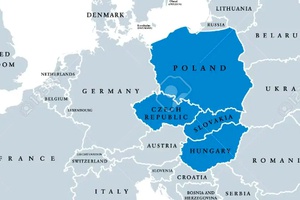The Visegrad Group is unraveling. Since his return to power in 2010, this platform has been used by Hungarian Prime Minister Viktor Orbán to strengthen his influence in the European Union. But at the start of 2023, “V4” looks more fractured than it has at any time in the past thirteen years. Poland, Hungary, the Czech Republic and Slovakia are clearly struggling to return to the kind of cooperation they had developed before Russia invaded Ukraine.
The last meeting of the V4, at the end of November, was revealing in this respect. It focused on the Nordic countries joining NATO. While Hungary is the only NATO member other than Turkey that has yet to ratify Sweden and Finland joining the military alliance, the rest of the V4 supports it. As Polish Prime Minister Mateusz Morawiecki, Czech Prime Minister Petr Fiala and Slovak Prime Minister Eduard Heger tried to convince Orbán to finally lay the cards on the table, he gave a cynical response, stressing that Hungary supported membership but that the Hungarian Parliament would not make a final decision until 2023.
The fragmentation of the V4 began before Russia invaded Ukraine, as in recent years the four countries have taken different approaches towards the European Union. While Slovakia and the Czech Republic have cautiously sided with the EU’s main liberal democracies, Poland and Hungary have clashed in Brussels over a wide range of strategic issues, from immigration to EU conditionality. rule of law through the supremacy of European law.
The Czech Republic, on the other hand, is not in conflict with the EU over the issue of the rule of law, which undermines Poland’s political potential to become the regional leader, a position that its economic weight and demographics would allow it. As for the only eurozone member within the group, Slovakia, it has integrated itself into the heart of Europe more tightly than the other three members of the V4, and this has inevitably shaped its position in Europe. However, as the Slovak government has just fallen, Bratislava is currently in such political turmoil that it could end up undermining democracy.
The war in Ukraine has further reshaped the power dynamics within the V4. While Poland has been at the forefront of international condemnation of the Kremlin, demanding arms deliveries to Ukraine and the toughest possible sanctions against Russia, Hungary has taken a markedly different approach. Viktor Orbán has frequently blocked or softened efforts to sanction Russia, thus weakening Western unity both within the EU and NATO, of which his country is a member. If Patriarch Kirill, the head of the Russian Orthodox Church, has not yet been put on the EU sanctions list, it is because the Hungarian government has opposed it.
These differences were also evident on December 13 at the last summit of the Committee of Permanent Representatives (COREPER), when all EU member states voted unanimously to suspend funds for Hungary. This unanimity was made possible by the fact that Hungary blackmailed other member states by vetoing €18 billion in aid to Ukraine, which ultimately turned out to be a self-destructive act. Polish President Morawiecki certainly surprised everyone by also threatening, at the start of the EU summit on December 15, to block these 18 billion, in response to the blocking of European funds intended for Poland. But he finally gave his consent and at the end of the year Orbán found himself completely isolated. Notably, neither the Polish government nor the Italian government vetoed the decision to suspend the disbursement of European funds to Hungary – an agreement which was brokered by the Czech EU Presidency.
The “Two Brothers” Move Away
When the Law and Justice Party (PiS) came to power in Poland in 2015, its leaders made Polish-Hungarian bilateral relations the main pillar of Visegrad. But at the start of Russia’s war against Ukraine, the Eurosceptic alliance of Hungarian Fidesz and PiS was fundamentally shaken. As Polish society mobilized to help Ukraine, Orbán’s image deteriorated sharply in Poland, due to his harsh anti-Kyiv rhetoric. The existential threat that Russia still represents in the eyes of the Poles, and the historical fear of being subjected to a new “division of Poland” largely explain Polish sensitivity. The Russian aggression raised collective anxiety to such a point that even the PiS could not ignore Orbán’s friendship with Putin.
Therefore, already in the spring of 2022, Jaroslaw Kaczynski, the leader of the PiS, openly criticized the Hungarian Prime Minister’s position on the assessment of the war and Russia’s role in it. In a similar spirit, President Morawiecki pointed out that “the paths of Hungary and Poland have diverged”. A meeting between Polish President Andrzej Duda and Hungarian President János Áder was canceled in March, and March 15 marked the first time in ten years that Polish guests did not travel to Budapest to support Orbán during the Peace March, a pro-government demonstration organized by the Hungarian GONGOs (GONGO: government NGOs). Op-eds published in conservative Polish newspapers demanded that the PiS administration sever its ties with Fidesz. Last April, polls showed that more than half of those polled in Poland called for a complete rethink and reassessment of the relationship with the Orbán administration.
Since September, however, it seems that the Polish government has been considering a reconciliation with Hungary, in order to be able to represent their common interests more effectively in the European Union and in the V4. In an interview in early October, the Polish prime minister was asked if the disagreements with Orbán had been resolved. Morawiecki replied: “They have not been resolved, but if we have misunderstandings in a family, do we have to lock ourselves in separate rooms and pretend that we do not live in the same house? Central Europe is our home. »
This inflection suggests that domestic political considerations, in a context of extreme polarization, tend to redefine the foreign policy agenda of the PiS, as is also the case in Hungary, for that matter. Ten months before the general elections in Poland, internal rivalry is set to intensify between the two flanks of the government, between Morawiecki and the Minister of Justice, the radical Zbigniew Ziobro, the main person responsible for the judicial overhaul the EU has opposite. This arguably explains why Morawiecki played the tough Eurosceptic at the last EU summit, jeopardizing aid to Ukraine.
What could maintain a tactical alliance between Hungary and Poland is that they are mutually dependent on each other in the Council of the EU with regard to the procedure of Article 7, which gives the possibility for the EU to sanction a Member State that does not respect its values. This is presumably the reason why in September 2022 the PiS joined the other nationalist parties and did not vote for the European Parliament resolution which classified Hungary as an “electoral autocracy”.
This alliance also has a domestic political interest. By pushing a Eurosceptic narrative, Fidesz and PiS claim that Brussels is undermining national sovereignty, identity and culture in an imperialist way. This is a populist tactic that has proven successful in both Hungary and Poland. EU criticism of the governments of these two countries has been portrayed as a mere pretext for ‘corrupt elites’ to attack Central European countries for upholding ‘traditionalist’ values while rejecting immigration, women’s and LGBT+ rights. As PiS channels electoral frustration to Brussels by accusing opposition leader Donald Tusk of being a German collaborator, Fidesz says the EU’s corrupt elite serves the interests of hawkish US Democrats, led by George Soros. The last symbolic link that unites Hungary and Poland is the “protection of the traditional family model formed by men and women”, a bastion that must be defended against the onslaught of modernity.
However, bilateral relations between Hungary and Poland have not been fully restored. Despite the rhetorical relaxation, Polish Foreign Minister Zbigniew Rau still does not receive his Hungarian counterpart Péter Szijjártó. This means that the PiS still does not want photo ops with Fidesz at government level. Cooperation is only maintained at the level of the presidency: we have seen Polish President Andrzej Duda meet the new Hungarian President Katalin Novák.
Orbán Has Reached His Limits in Europe
Orbán’s isolation in the Council of the EU illustrates that his veto policy has reached its limits. We saw it with the agreement on aid of 18 billion euros for Ukraine and that on the minimum rate of corporate tax, even though the Hungarian government presented this agreement as a success of the Prime Minister. Admittedly, Orbán’s representatives managed to obtain some amendments, but they had to accept the agreement for Ukraine, which the Hungarian government had opposed.
Orbán will continue to exploit whatever political divides he can, just as he will continue to forge alliances outside of the Euro-Atlantic stream, especially with American Republicans and far-right religious fundamentalists in Europe.
Hungary is going through multiple economic crises, and it will also deliberately strengthen its ties with China. One of the challenges of these links is to develop commercial opportunities for the clientelist network of which Orbán is the center. Hungary does not benefit significantly, but the Prime Minister does, because it enriches this network which in turn helps him cement his power. Therefore, it can be expected that Hungary will continue to pursue a policy of obstruction of critical EU decisions regarding China.
It is obviously not credible that it can put its connection with China before its membership in Europe, since it depends entirely on EU funds and that 80% of its foreign trade is still carried out within of the EU and with the United States. But perceptions matter. The strengthening of relations with Beijing is well seen by the hard core of Fidesz voters. Amid growing tensions between Hungary and the EU, pro-government media audiences see the close ties with Beijing as a positive assessment of the Hungarian government’s position on the world stage. These ties bolster the regime’s domestic legitimacy, suggesting that Hungary is such an important player on the world political stage that even a superpower wants to be in its good graces.
This article is originally published on telos-eu.com









